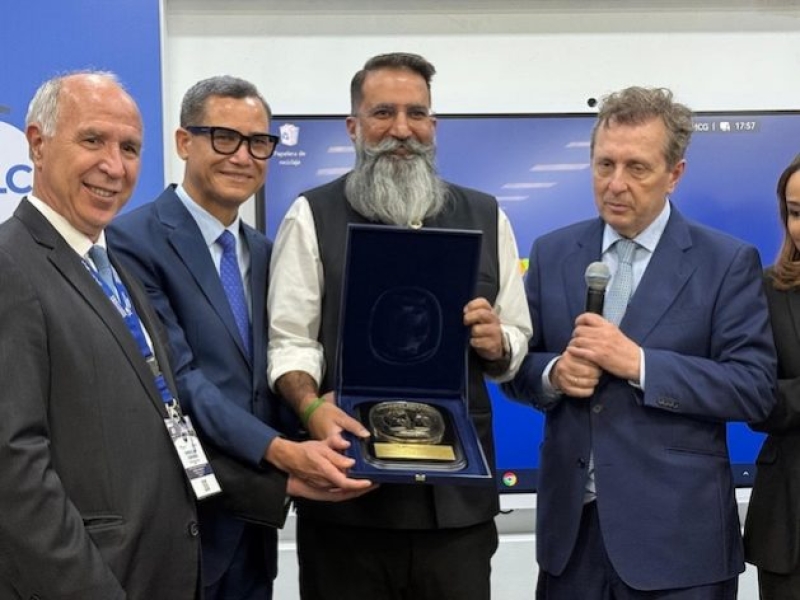- Hadi is no more, state mourning on Saturday: CA |
- Bangladesh capital market falls; weekly turnover lowest |
- Sharif Osman Hadi No More |
- Tarique Rahman to Return Home With Daughter on Dec 25 |
- ILO praises Bangladesh’s labour reforms, new milestones |
Activist Bhuwan Ribhu Awarded for Ending Child Marriage

Dominican Republic’s Labour Minister Eddy Olivares Ortega and World Jurist Association President Javier Cremades present the Medal of Honor to Just Rights for Children founder Bhuwan Ribhu. Photo courtesy
Bhuwan Ribhu never intended to become a child rights activist. A trained lawyer with a promising career ahead, he found his calling in an unexpected moment—at a grassroots meeting in Jharkhand, eastern India. It was there that someone stood up and said, “Girls from my village are being taken far away, to Kashmir, and sold into marriage.” That moment, Ribhu recalls, changed everything.
Faced with the horrifying reality of children being trafficked and forced into marriage, Ribhu realised that isolated efforts were not enough. “We tried to help, but we weren’t stopping the problem,” he says. “That’s when I realised this isn’t just a social issue—it’s a criminal justice issue. And it needs collective action on a national scale.”
Today, Ribhu leads Just Rights for Children, a nationwide legal and advocacy network working to protect children from exploitation. His most prominent initiative, the Child Marriage-Free India (CMFI) campaign, has grown into one of the world’s largest grassroots movements against child marriage, uniting 262 organisations and reaching over 260 million people.
In recognition of his relentless advocacy, Ribhu was recently honoured with the Medal of Honor by the World Jurist Association at the World Law Congress held in the Dominican Republic. The award celebrates his tireless efforts to safeguard children’s rights and push for systemic change.
But for Ribhu, the accolade is not about personal recognition. “This is a reminder that the world is watching—and that children are counting on us,” he said in his first interview after receiving the award.
Since 2005, Ribhu has used his legal background to fight—and win—several landmark cases in Indian courts. His efforts have shaped critical child protection laws: redefining child trafficking, mandating police intervention when children go missing, criminalising child labour, and building legal mechanisms to support survivors of abuse.
One of the most significant legal victories came when courts ruled that all missing children should be presumed trafficked, a decision that led to a dramatic drop in unreported child disappearances—from over 117,000 cases annually to just under 68,000.
A key strategy of CMFI was engaging religious leaders—figures who play central roles in solemnising marriages in India. “If religious leaders refuse to marry children, the practice will stop,” Ribhu reasoned. The campaign reached thousands of Hindu priests, Muslim clerics, Christian pastors, and others, asking them to pledge: “I will not marry a child, and I will report child marriage if I see it.”
The effect was transformative. On days like Akshaya Tritiya, once notorious for mass child weddings, temples and religious institutions now reject such ceremonies.
“Faith can be a powerful force for justice,” says Ribhu. “Religious texts support the education and protection of children.”
The campaign’s impact has extended beyond India. In January, Nepal launched its own Child Marriage-Free Nepal initiative, inspired by Ribhu’s model. All seven provinces of Nepal have committed to ending the practice. The movement is now active in 39 countries, including Kenya and the Democratic Republic of Congo, with growing calls for a global legal child protection network.
Ribhu has also authored two books—Just Rights and When Children Have Children—where he outlines the PICKET framework: a legal, institutional, and ethical roadmap for ending child exploitation. “It’s not just about shouting for change,” he says. “It’s about building systems that protect children every day.”
In 2024 alone, the campaign helped stop over 260,000 child marriages and rescued more than 56,000 children from trafficking and exploitation in India. By 2030, Ribhu hopes to bring India’s child marriage rate below 5 percent.
Yet challenges remain. In Iraq, girls as young as 10 can still be legally married. In the United States, 35 states allow child marriage under various conditions.
“Justice can’t be occasional,” Ribhu asserts. “It must be part of the system, everywhere.”
Despite the doubts of many who questioned his decision to abandon legal practice, Ribhu finds deep purpose in his work. One of his most cherished memories is his son telling him: “Even if you save just one child, it’s worth it.”
Ribhu believes in Gandhian trusteeship—that one's talents and privileges should be used to serve the most vulnerable. “I may not be the one to fight child marriage in Iraq or Congo. But someone will. And we’ll stand beside them.”
For Ribhu, the Medal of Honor is more than a personal milestone—it’s a platform to connect, expand, and inspire.
“This award says to the world: change is possible. And it’s already happening.”

